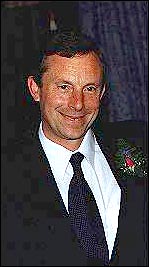– Dorothy – 17/4/97
“Events following the murder of Hilda Murrell”
This is the third of five articles about Commander Rob Green’s transition from trained nuclear killer and to a leading international peace activist. Be sure to read the previous articles in the series.
Hilda’s Fatal Three Mile Island Connection Why was Hilda Murrell murdered? She was a 78 year-old woman devoted to the conservation of the best in life – a former successful professional rosegrower, a botanist of considerable skill who was currently working on the hazards of radioactive waste. Fascinated by the rich history of the British Isles, she was a true patriot, passionately striving to preserve the British cultural heritage for future generations.
 |
| Rob Green |
After thirteen years research, Rob says he has reason to believe – but no proof – that she was murdered “because of what the nuclear industry thought she knew. It was not her criticisms of the government’s policy on nuclear waste, which were no threat. It was what she was thought to know (but didn’t) about the main cause of the meltdown at Three Mile Island: a fundamental design flaw in the pressurised water reactor – namely the low melting point of the alloy in the control rods – which had been covered up.” This design was adopted by the British government after strong pressure from Mrs Thatcher.
A retired scientist, whom Hilda had approached for a brush-up on her nuclear physics, had stumbled on this design flaw. He was spied on and intimidated by the nuclear industry, which prevented him from pursuing it. The industry then moved against Hilda because of her connection with him – though he never briefed her on his control rod fears. Rob claims that “the inquest was a farce. The police refused to let me see the autopsy report; frightened witnesses let me know they were under pressure to frame any petty criminal; Hilda’s phone had been interfered with professionally. Then I began to experience harassment in my pursuit of the truth.
Taking up Hilda’s Torch Rob went on: “This whole process radicalised me. I realised that the entire British system had been corrupted and poisoned by nuclearism.” Then Chernobyl happened, followed by a big planning inquiry into a second pressurised water reactor to be built not far from where Rob lived. He attended as an independent objector and used Hilda’s money to bring in expert witnesses. He also researched the control rod design flaw with the retired scientist whom Hilda had interviewed, and they testified as a team. They learned a lot more about the nuclear industry and the design problem, and this hardened Rob’s resolve to pursue it further.
Rob Feared Nuke Use in Gulf War He tried to keep clear of nuclear weapons; but this became harder with the break-up of the Soviet Union and the difficulties for the Navy resulting from the Trident decision. But it was the Gulf War which finally forced Rob to speak out. “Here was a scenario where nuclear weapons really could be used. My Naval Intelligence training told me that, if provoked by a Western punitive expedition, Saddam Hussein would be tempted to attack Israel in order to split the coalition and draw Israel in. If he used chemical-headed Scud missiles, then nothing could stop Israel from retaliating with nuclear weapons.” But Rob feared that the entire Arab world would then erupt in outrage, and Israel’s security would be destroyed forever:”The ultimate own goal.”
Two days before the air war began, Rob spoke out against nuclear weapons to 20,000 anti-Gulf War demonstrators from the foot of Nelson’s Column (“of all places!”). It was very traumatic: “I felt I was going through the intellectual equivalent of withdrawal from hard drug addiction. I was breaking out of not just my pro-nuclear brainwashing: I felt I was committing high treason, and would be branded disloyal by my former naval friends. The British military establishment is deeply tribal, and has powerful ways of discouraging heretics.” He was therefore much relieved when the only criticism came from an ex-Colonel pundit before appearing with him on TV. “He said:’Of course you’re entitled to your views, old boy; but do you have to wear your heart on your sleeve?’ I replied:’It’s not my heart – it’s my brain.’ He just walked away.”
Vindicated Rob continued:”In the event, Israel suffered 38 Scud attacks. For the first time, a nuclear-armed State had been attacked and its capital threatened – and by a non-nuclear State too. Israelis cowering in gas-masks in their basements must have wondered what had happened to their nuclear deterrent. Meanwhile, in London the IRA came close to wiping out the British Cabinet with mortar bombs fired from a van. Polaris was not only totally irrelevant in dealing with such a terrorist attack: it encouraged terrorists to try to get hold of nuclear weapons.”
One of Rob’s inspirations came from another former British naval officer. As early as 1979, in the last speech before he was murdered, Admiral of the Fleet Lord Louis Mountbatten had stated:”I have never been able to accept the reasons for the belief that any class of nuclear weapons can be categorised in terms of their tactical or strategic purposes… the nuclear arms race has no military purpose. Wars cannot be fought with nuclear weapons.”
Rob points out that, even when a nuclear state is facing defeat by a non-nuclear state, the nuclear state has been known to accept such defeat rather than escalate the conflict by using nuclear weapons. The USA withdrew from Korea and Vietnam, and the USSR from Afghanistan, rather than resorting to nuclear revenge.
In spite of Israel’s nuclear capability Saddam Hussein attacked it with Scud missiles. It became increasingly clear to Rob that nuclear deterrence doesn’t work!
Read the next article to find out where he found an alternative
deterrent that he believes can work. People
Making Changes Main Page




